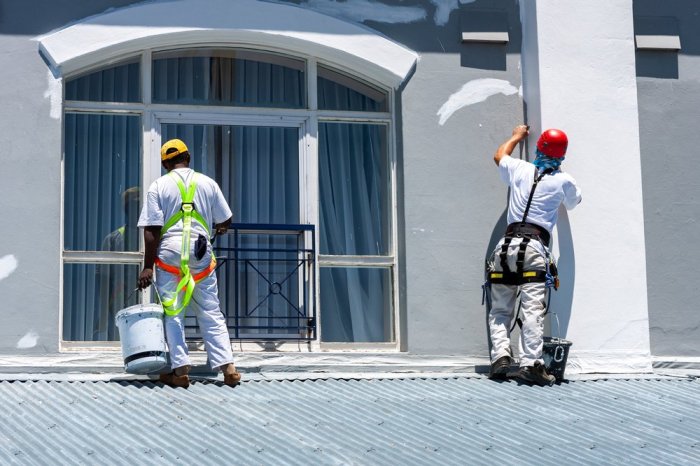
As we delve into the realm of commercial painting contractors, we uncover the pivotal role they play in the construction industry. From large-scale projects to intricate details, their expertise ensures the perfect finish every time. Let's explore the intricacies of this profession together.
Overview of Commercial Painting Contractors

Commercial painting contractors play a crucial role in the construction industry by providing professional painting services for commercial buildings and properties. Their expertise and skills ensure that the painting job is done efficiently, safely, and with high quality standards.
Examples of Commercial Painting Projects
- Office Buildings: Commercial painting contractors are often hired to paint the interior and exterior of office buildings to create a professional and welcoming environment for employees and clients.
- Retail Stores: Painting contractors are essential for retail stores to maintain a fresh and attractive appearance that reflects the brand and attracts customers.
- Hotels and Restaurants: These establishments require regular painting maintenance to keep up with changing trends and ensure a pleasant ambiance for guests.
Importance of Hiring Specialized Contractors
It is important to hire specialized commercial painting contractors for large-scale projects because they have the necessary equipment, experience, and knowledge to handle complex painting jobs efficiently. These contractors understand the specific requirements of commercial properties and can deliver high-quality results within the specified timeline and budget.
Services Offered by Commercial Painting Contractors
Commercial painting contractors offer a wide range of services tailored to the needs of businesses and commercial properties. These services go beyond what is typically offered for residential projects, as they are designed to meet the unique requirements of commercial buildings.
Types of Services
Commercial painting contractors provide services such as interior and exterior painting, epoxy flooring, industrial coatings, waterproofing, and specialty finishes. They are equipped to handle large-scale projects and work efficiently to minimize disruptions to business operations.
- Interior and Exterior Painting: Commercial painters are skilled in painting large spaces, such as office buildings, retail stores, warehouses, and restaurants.
- Epoxy Flooring: This durable flooring option is ideal for commercial spaces that experience heavy foot traffic or require a seamless and easy-to-clean surface.
- Industrial Coatings: Commercial painting contractors can apply specialized coatings to protect surfaces from corrosion, chemicals, and other environmental factors.
- Waterproofing: Protecting commercial buildings from water damage is crucial, and commercial painters offer waterproofing services to prevent leaks and moisture intrusion.
- Specialty Finishes: From faux finishes to textured coatings, commercial painters can create unique looks that enhance the aesthetics of a commercial space.
Residential vs. Commercial Services
While residential painting projects focus on individual homes and small-scale properties, commercial painting contractors are equipped to handle larger projects with specific requirements. Commercial painters have the expertise to work on buildings with unique architectural features, multiple stories, and complex layouts.
Importance of Specialized Services
Commercial buildings have different needs compared to residential properties, which is why specialized services offered by commercial painting contractors are essential. These services ensure that the paint job is durable, long-lasting, and meets the specific requirements of the commercial space.
Whether it's protecting against wear and tear, enhancing the building's aesthetics, or ensuring compliance with industry regulations, specialized services play a crucial role in maintaining commercial properties
.
Qualifications and Expertise
Commercial painting contractors need to possess specific qualifications and certifications to handle large-scale projects successfully. Moreover, expertise in various aspects of commercial painting is essential for delivering high-quality results.
Qualifications and Certifications
Commercial painting contractors are typically required to have the following qualifications and certifications:
- Valid contractor's license
- Insurance coverage
- Safety certifications
- Knowledge of environmental regulations
Expertise for Large-Scale Projects
Handling large-scale commercial painting projects requires a high level of expertise in the following areas:
- Project management skills
- Ability to work with a team
- Knowledge of specialized painting techniques
- Understanding of surface preparation and coating application
Training and Experience
Becoming a successful commercial painting contractor involves a combination of training and experience. Some key aspects include:
- Formal education or apprenticeship in painting
- Hands-on experience in the field
- Continuous learning and staying updated on industry trends
- Building a strong portfolio of successful projects
Best Practices in Commercial Painting
Commercial painting contractors follow certain best practices to ensure quality work and customer satisfaction. These practices include attention to detail, proper surface preparation, the use of high-quality materials, adherence to safety protocols, and efficient project management.
Tips for Selecting the Right Commercial Painting Contractor
- Research and ask for recommendations from other businesses or property owners who have used commercial painting services.
- Check the contractor's credentials, licenses, insurance coverage, and certifications to ensure they are qualified and trustworthy.
- Request a detailed written estimate that includes the scope of work, timeline, materials to be used, and cost breakdown.
- Review past projects and client testimonials to gauge the contractor's reputation and quality of work.
- Communicate openly with the contractor about your expectations, timelines, and budget constraints.
Use of Technology and Innovative Techniques
Commercial painting contractors are increasingly incorporating technology and innovative techniques to enhance the efficiency and quality of their work. This includes the use of digital color matching tools, advanced spray painting equipment, eco-friendly paint options, and project management software for better organization and communication.
By staying up-to-date with the latest trends and tools in the industry, contractors can deliver superior results and meet the evolving needs of their clients.
Challenges Faced by Commercial Painting Contractors
Commercial painting contractors face various challenges during projects that can impact the quality, timeline, and overall success of the job. It is essential for contractors to be prepared to tackle these obstacles effectively.
Weather Conditions
Weather conditions can significantly affect commercial painting projects, especially outdoor ones. Rain, extreme heat, or cold temperatures can impact the drying time of paint and the overall finish quality. To overcome this challenge, contractors often monitor weather forecasts closely and schedule work during optimal conditions.
They may also use specialized paints or equipment designed to withstand varying weather conditions.
Tight Deadlines
Meeting tight deadlines is another common challenge for commercial painting contractors. Clients may have strict timelines for completing the project, which can put pressure on the contractor to work efficiently without compromising quality. To overcome this challenge, contractors may allocate additional resources, such as manpower or equipment, to expedite the painting process.
Effective project planning and coordination are crucial to ensure deadlines are met without sacrificing the final result.
Unexpected Issues
Unexpected issues can arise during commercial painting projects, such as the discovery of underlying structural problems, changes in client requirements, or supply chain disruptions. Contractors must be flexible and adaptable to address these issues promptly. Communication with the client is key to managing unexpected challenges, as contractors need to keep them informed and propose solutions to mitigate any impact on the project timeline and budget.
Conclusive Thoughts
In conclusion, the world of commercial painting contractors is a dynamic one, filled with challenges and triumphs. Their dedication to quality work and innovative approaches truly sets them apart in the realm of construction.
FAQ Guide
What are the common challenges faced by commercial painting contractors?
Common challenges include managing tight deadlines, working around weather conditions, and ensuring quality work amidst project complexities.
What qualifications and certifications are necessary for commercial painting contractors?
Commercial painting contractors typically need certifications in painting techniques, safety training, and experience working on commercial projects.
How do commercial painting contractors handle unexpected issues during projects?
Contractors often rely on flexibility, problem-solving skills, and effective communication to address any unexpected issues that may arise during commercial painting projects.
 As we delve into the realm of commercial painting contractors, we uncover the pivotal role they play in the construction industry. From large-scale projects to intricate details, their expertise ensures the perfect finish every time. Let's explore the intricacies of this profession together.
As we delve into the realm of commercial painting contractors, we uncover the pivotal role they play in the construction industry. From large-scale projects to intricate details, their expertise ensures the perfect finish every time. Let's explore the intricacies of this profession together.
 Commercial painting contractors play a crucial role in the construction industry by providing professional painting services for commercial buildings and properties. Their expertise and skills ensure that the painting job is done efficiently, safely, and with high quality standards.
Commercial painting contractors play a crucial role in the construction industry by providing professional painting services for commercial buildings and properties. Their expertise and skills ensure that the painting job is done efficiently, safely, and with high quality standards.












